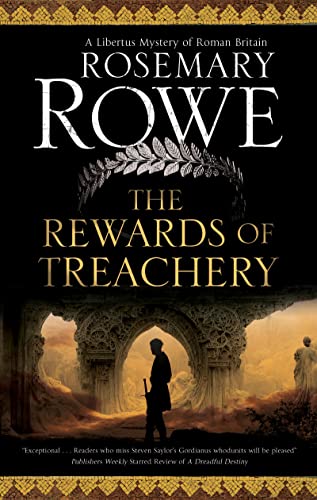The Rewards of Treachery (A Libertus Mystery of Roman Britain, 20)
Glevum, 198 CE. Since his adoptive father, pavement-maker and amateur investigator Libertus, fled Glevum several years ago, Junio is now called upon to serve Libertus’s patron, Magistrate Marcus Septimus. Arriving home after a frustrating day, Junio is greeted by two unexpected visitors. Letigines, Marcus’s courier-slave, requests that Junio attend on his master immediately. A valuable silver cloak-clasp, sent to a silversmith for repair, is missing. The repaired item, picked up by Letigines, turned out to be a base metal copy, and he is in for a flogging at best for not having noticed the fake. Junio’s second visitor is the slave Anlyan, carrying a long scroll Junio doesn’t have time to peruse, but he vaguely recognizes this newcomer. Harried by his wife’s imminent childbirth, Junio entrusts Anlyan with fetching the local midwife as he rushes off to answer Marcus Septimus’ command. He is informed that the silversmith has disappeared along with his stock, including the precious cloak-clasp, and is tasked to find him. Does the silversmith have ties to the Celts and the illegal silver trade? Are the two random visits connected?
Roman Britain is familiar territory for the author, and she packs in fascinating background detail without overwhelming her story. I slipped easily into those ancient times, the superstitions, the ritual cleansings, mandatory trade closures on ill-starred days, the occasional need for a sacrifice, unwieldy parchment scrolls, and the normality of owning slaves. Although Junio is a favoured citizen, he must guard his tongue around those above him, as his investigation leads him into dangerous territory. Soon the seemingly innocuous mystery of a missing piece of jewellery becomes a complex, multi-layered plot. This is the latest installment in a long-running series. The detailed author’s note explains the political background.










